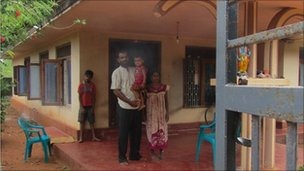 Selvarajah Ragunathan greets me warmly at his Jaffna home. His face is kindly but furrowed with sadness.
Selvarajah Ragunathan greets me warmly at his Jaffna home. His face is kindly but furrowed with sadness.
He lost his brother and sister in the early years of the civil war, more than 20 years ago.
Like many others, he left his rural home when the army took over the land.
He worked for years in the Gulf but could not save much. Now he rents this place in the city – a quite spacious house with a garden, where he lives with his wife and their 21-month-old son, Adchayan.
But since he started the tenancy two years ago things have become very worrying. Rents in the city are soaring.
The initial rent was 1,500 rupees ($15; £9) a month, which may sound little to many people but was a lot for him.
"Now the landlords say they want 10,000 rupees, as they can get that rent from newcomers," he says.
"We’re staying in a nice house and that’s what people see. But nobody knows that we didn’t eat today."
He is now jobless, while his wife has a government job earning 16,000 rupees a month.
The family now faces eviction.
Relocating families
It’s not hard to find reasons why property prices are booming.
Opposite a large Catholic church I visit the office of a major newcomer to Jaffna, a property developer called Ran Homes.
Outside, above its blue and white wall, are bright placards showing brand-new villas and slogans.
They state "Your beautiful home is waiting for you" and "You relax, we build your dream home."
The business manager Y M Haron, recently relocated to Jaffna from Colombo, shows me photos of sprawling, flawless-looking mansions.
His main customers are local Tamil people who moved abroad in the war and still live overseas. Many seek homes for their elderly parents, who are moving back to Jaffna from the capital.
"[For] thirty years they are out of the country," he says. "So I think they have money, they have earned, they want to invest here and some want to have a second house here.
"They will be working there [overseas] and when they come for holidays they can stay with their parents here."
You can see such homes going up in Jaffna streets, costing up to $150,000 (or more – "there’s no limit" says Mr Haron).
Modernisation drive
Cheek by jowl with them are traditional villas, beloved of many whose roots are here in Jaffna, but now crumbling – their wrought-iron decaying – and facing possible demolition.
On a central street corner two young men from the Airtel mobile phone provider, a huge player in the subcontinent, stage a mini-drama, a customer promotion.
The town is rapidly modernising, just two years after Jaffna was linked up with the rest of Sri Lanka when the main road north was reopened.
There are many soldiers in the streets – the military still runs most aspects of life here – but also shiny new businesses including supermarket chains and banks including HSBC.
A young woman who has travelled from Colombo for a relative’ s wedding tells the BBC the economic changes are excellent.
She explains that the only way to travel to Jaffna during the civil war was by air or sea.
"Now it’s very easy. Earlier, people felt there was a lot of fighting but now it looks so different."
‘Commercial purpose’
But some Jaffna residents object to the manner in which the town is developing. They say the new businesses are here to make money rather than benefit locals.
Indeed, several developers we speak to admit they bring in most of their builders from far away in southern Sri Lanka.
They say the local Tamil people do not yet have the right skills.
S Sokalingam, a retired government servant, is not impressed and says many locals are not feeling the benefits.
"All the banks have come here," he says. "But the way they come here, I think people have not benefited, because they have come with some commercial purpose."
He says while it is good that the banking sector is expanding, "but at the same time they must help the poor people to start business, to start some small industries".
Another man stops us in the street to complain about rising prices, which he blames on the post-war influx of southern Sri Lankans.
He says prices of onions, tobacco and grapes – which are grown in Jaffna district – have all risen.
There is little chance of Jaffna turning the economic clock back.
Even as new homes are built, so too are small hotels, in keeping with the government’s promise that tourism in the once-war-torn north will also take off.
It is good for developers – but not for people like Ragunathan.
"Jaffna is developing," he says. "Foreigners are coming and going. We’re happy about that. We feel proud to see them in our home town."
(For updates you can share with your friends, follow TNN on Facebook and Twitter )
